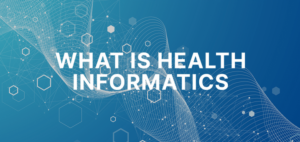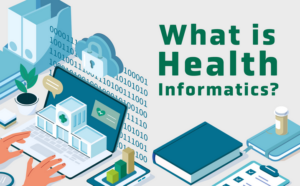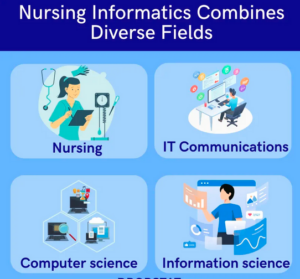Nursing Informatics Career Overview
 Nursing informatics is an interdisciplinary field that integrates nursing science, information technology (IT), and data management to enhance healthcare.
Nursing informatics is an interdisciplinary field that integrates nursing science, information technology (IT), and data management to enhance healthcare.
The role of a nurse informaticist involves leveraging technology to improve patient care, streamline clinical workflows, and make healthcare systems more efficient.
With the growing reliance on healthcare IT (also referred to as Health IT) and the increasing demand for data-driven decision-making in healthcare, nursing informatics has become an essential field in modern healthcare systems.
What is Nursing Informatics?
Nursing informatics involves the use of technology and data analysis to manage and process healthcare information, supporting clinical practice, education, research, and administration. It bridges the gap between nursing, information technology, and data science, improving patient outcomes and healthcare delivery.

Struggling to meet your deadline?
Get your assignment on Nursing Informatics Career Overview done by certified MDs and PhDs in the USA. ORDER NOW!
Overview of Nurse Informaticists
Nurse informaticists play a crucial role in the development, implementation, and management of health information systems. They use their clinical expertise alongside technical skills to improve healthcare practices and systems. Whether working in a hospital, healthcare IT company, or academic setting, their work is instrumental in modernizing healthcare systems through technology.
Nursing Informatics: Bridging Healthcare and Technology
Nursing informatics is the link between nursing practice and technology. Nurse informaticists utilize data analytics, clinical data management, and healthcare IT systems to manage healthcare information and improve patient care processes. Their contributions help streamline operations, reduce errors, and support evidence-based practice, ultimately enhancing patient outcomes.
How Long Does it Take to Become a Nurse Informaticist?
The path to becoming a nurse informaticist typically takes 4-6 years, depending on the educational route and career progression. Here’s a breakdown of the typical timeline:
Timeframe to Become a Nurse Informaticist
- Bachelor of Science in Nursing (BSN) – Typically takes 4 years of undergraduate education.
- Pass the NCLEX-RN Exam – Required to obtain registered nurse licensure.
- Clinical Experience – Nurse informaticists often gain 2-3 years of clinical nursing experience before pursuing specialized informatics roles.
- Certification in Nursing Informatics – Though optional, certification such as RN-BC (Registered Nurse – Board Certified in Informatics) can improve career prospects and enhance credibility in the field.
- Graduate Education – For more advanced roles such as Chief Nursing Informatics Officer (CNIO), obtaining a Master of Science in Nursing (MSN) or even a Doctor of Nursing Practice (DNP) may be necessary.
Education Pathways for Nursing Informatics Careers
- BSN (Bachelor of Science in Nursing): Required to start a career in nursing informatics. This degree takes around 4 years to complete.
- Graduate Programs: For advanced roles, such as clinical analyst or nursing informatics specialist, a Master’s degree in Nursing Informatics or a DNP can be pursued. These typically take 2-4 additional years of education.
Nursing Informatics Career Pathways
The field of nursing informatics offers a range of career opportunities. Depending on your interests and experience, there are various roles you can pursue. These roles blend nursing practice, technology, and data management skills to improve healthcare systems.
Nurse Informaticist Roles and Job Titles
- Nursing Informatics Specialist: Focuses on managing healthcare data and improving clinical decision-making through the implementation of IT systems.
- Clinical Analyst: Works within healthcare organizations to analyze data and find solutions that optimize clinical workflows and patient outcomes.
- Chief Nursing Informatics Officer (CNIO): Leads the organization’s efforts in incorporating IT systems in nursing practice and ensures alignment with patient care strategies.
- Manager of Clinical Informatics: Oversees the implementation and management of informatics tools and resources within healthcare organizations.

Top Jobs in Nursing Informatics
- Nursing Informatics Specialist: Ensures the proper implementation of clinical information systems, manages data for better clinical outcomes, and supports decision-making processes.
- Clinical Analyst: Analyzes and interprets data to improve operational efficiencies and clinical workflows.
- Chief Nursing Informatics Officer (CNIO): Directs strategic planning for IT integration in nursing practice across healthcare systems, focusing on improving patient care through data and technology.
- Manager of Clinical Informatics: Coordinates and implements informatics projects and initiatives aimed at improving clinical practices and patient care quality.
Each of these roles offers a unique set of responsibilities, ranging from technical work with IT systems to high-level leadership roles in healthcare management.
Where Do Nurse Informaticists Work?
According to the 2020 HIMSS Nursing Informatics Survey, over 68% of nurse informaticists work in hospitals or health systems. Other common work settings include higher education and ambulatory care.
Salary and Job Outlook for Nurse Informaticists
Nursing informatics is not only a fulfilling career but also a lucrative one. The demand for nurse informaticists is on the rise, driven by the increasing adoption of technology in healthcare and the need for data-driven decision-making.
Nursing Informatics Salary Overview
- Nurse informaticist salary varies depending on role, experience, and location, but most professionals earn between $61,000 and $115,000 annually.
- Senior roles, such as Chief Nursing Informatics Officer (CNIO), can command higher salaries, with figures reaching $134,680 or more annually.
Job Outlook for Nurse Informaticists
The job outlook for nurse informaticists is projected to grow by 9% from 2020 to 2030, in line with the overall growth of registered nurses. The nursing informatics demand is expected to increase as healthcare institutions continue to rely on technology and data management systems to improve patient care and operational efficiency.
Salary Expectations by Role in Nursing Informatics
- Nursing Informatics Specialist: $79,790
- Clinical Analyst: $70,680
- Chief Nursing Informatics Officer (CNIO): $134,680
- Manager of Clinical Informatics: $97,520
The higher the experience and level of education, such as obtaining an MSN or RN-BC certification, the greater the potential for salary growth in the nursing informatics field.
How to Become a Nurse Informaticist
Becoming a nurse informaticist is an exciting journey that combines nursing practice with cutting-edge technology. Here’s a step-by-step guide:
Step-by-Step Guide to Becoming a Nurse Informaticist
- Step 1: Obtain a Bachelor of Science in Nursing (BSN) – A BSN is the foundational requirement to enter the field of nursing informatics.
- Step 2: Pass the NCLEX-RN Exam – To become a licensed RN, you need to pass the National Council Licensure Examination.
- Step 3: Gain Clinical Experience – Nurse informaticists typically have 2-3 years of clinical nursing experience before specializing in informatics.
- Step 4: Obtain Nursing Informatics Certification (Optional) – While not mandatory, obtaining RN-BC certification in nursing informatics can enhance your credibility and marketability.
- Step 5: Continue Education and Professional Development – Consider pursuing advanced education, such as a Master’s in Nursing Informatics, to advance to leadership positions like CNIO or Clinical Informatics Manager.
Nursing Informatics Skills and Expertise
Nursing informaticists need a blend of technical skills, clinical knowledge, and interpersonal abilities to excel in their roles. Here’s a closer look at the essential skills for success in nursing informatics:
Essential Skills for Nursing Informatics Careers
- Clinical Skills: A strong understanding of nursing practice, patient care, and healthcare workflows is crucial for translating data into actionable insights.
- Technical Skills: Proficiency with healthcare IT systems, data analytics tools, and clinical software is essential.
- Project Management: Managing projects related to IT implementation, system updates, and data management requires solid project management skills.
- Problem-Solving and Analytical Skills: Nurse informaticists must be able to analyze complex data and propose actionable solutions to optimize healthcare systems.
- Soft Skills: Effective communication, teamwork, and conflict resolution are key in working with healthcare teams and IT professionals.

Nursing Informatics Job Settings
Nurse informaticists can work in various settings, from hospitals to academic institutions to remote work environments. The diverse work options in nursing informatics allow for flexibility and specialization based on interests.
Where Do Nurse Informaticists Work?
- Hospitals and Health Systems: Over 68% of nurse informaticists work in hospitals, bridging the gap between clinical staff and IT departments to improve patient care and operational efficiency.
- Colleges and Universities: Nurse informaticists in academia engage in research, education, and training, contributing to the growth of the nursing informatics field.
- Ambulatory Care: In ambulatory care settings, nurse informaticists manage patient data, improve systems for patient tracking, and ensure that IT systems support seamless care delivery.
Remote Nursing Informatics Jobs
With the increasing trend of telehealth and remote work, many nurse informaticists now work from home. According to the HIMSS report, approximately 45% of nurse informaticists work remotely at least part-time, and 21% work remotely full-time. Remote roles often involve managing or optimizing healthcare IT systems, conducting data analysis, or supporting telemedicine initiatives.
Professional Organizations for Nursing Informatics
American Nursing Informatics Association
ANIA provides nursing informatics certification. The organization supports its national membership with an annual conference, continuing education resources, and journals and publications through its online library. Other benefits include a virtual connection forum, job listings, and 27 local chapters. ANIA also offers discounted student memberships.
The Alliance for Nursing Informatics
ANI aims to advance nursing informatics through education, leadership, policy, and research. The organization represents individual nurse informaticists at local, regional, national, and international levels. Groups focusing on nursing informatics can qualify as affiliates.
Healthcare Information and Management Systems Society, Inc
HIMSS advises healthcare leaders, policymakers, and stakeholders on best practices. This organization offers expertise in health analytics, innovation, public policy, research, and workforce development. Members can join as individuals, corporations, or nonprofit partners and benefit from extensive digital educational resources.
American Health Information Management Association
AHIMA has a digital community platform for members to access content and interact with the organization and fellow professionals. AHIMA also hosts an annual conference, posts job listings, publishes an online journal, and provides certification options. Information professionals can become members, and students can join at a reduced rate.
Conclusion
Nursing informatics offers an exciting and rewarding career path for nurses who are passionate about technology, data management, and improving patient care. The field offers robust job prospects, a growing demand for skilled professionals, and an opportunity to shape the future of healthcare. With diverse roles, flexible work options, and competitive salaries, nursing informatics presents an excellent opportunity for those interested in combining healthcare and technology to make a positive impact on patient outcomes.

Dont wait until the last minute.
Provide your requirements and let our native nursing writers deliver your assignments ASAP.

